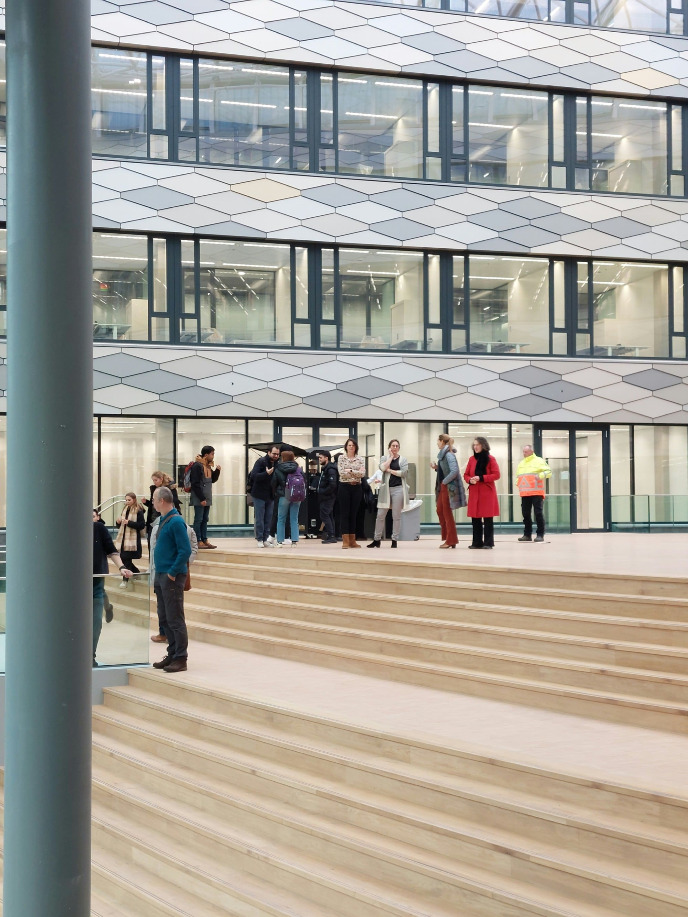Professor Ben Feringa gives first lecture in brand new Feringa Building
Monday 5 February 2024 marks a historic moment for the University of Groningen (UG) with the first use of Feringa Building for teaching activities. The board of Faculty of Science and Engineering (FSE) enthusiastically welcomed the first students and lecturers at the start of the second semester in their brand new teaching and research building. It was also a unique moment for Professor Ben Feringa. He gave his first lecture today in the building that bears his name.
From Nijenborgh 4 to Feringa Building
"When I was a young student and eighteen years old, I remember how proud we were when we were the first group to be allowed to do research there (red. Nijenborgh 4)," Professor Ben Feringa tells us a little tense. "And now I get to lecture and train our students in the new building for the first time. This is a very special and also a bit of an emotional moment."
Meeting place interdisciplinary collaboration
Joost Frenken, dean of the Faculty of Science and Engineering, together with the faculty board and numerous staff members, gave a festive welcome to the first students and teachers this morning. "I think it really is a fantastic step. Feringa Building is a jewel of the university." Despite Feringa Building being the largest building the university has ever constructed, the faculty is still looking for more space in the future due to growth.
But for now, Frenken is especially pleased with the stunning design, which serves as a great meeting place and offers numerous opportunities for interdisciplinary collaboration between different scientific disciplines. "Many institutes with many disciplines come together here. I expect that we will get a lot of collaboration."
Relocation of research groups starts from March
From March 2024, the move of staff and research equipment will be phased, and the laboratories will be operational for the first time. Feringa cannot wait for his group to move too: "The laboratories are equipped with all modern techniques and facilities. In a few months, we will move here with our research group. To our new laboratory, a new room," he says proudly.





Educating students for a sustainable future
Before Feringa walks into the lecture hall to give his first lecture in the building named after him, he shares what this new building means towards the future. "Here we can train students to the very latest standards and prepare them for the future: our sustainable society and the new industry we are going to discover. We are going to make fantastic scientific discoveries in this new laboratory building. We can now compete with any laboratory in the world." The UG is looking forward to a promising future full of discoveries and innovations, where the scientists of tomorrow will be formed.
With the construction of Feringa Building, the UG underlines its ambition to continue contributing to internationally leading research in fields such as chemical engineering, (nano)technology, materials research and astronomy.
Sustainable and energy-efficient building
It is not only in terms of teaching and research facilities that the faculty is improving. Great advancement is also being made in terms of sustainability and energy efficiency. The heating system (disconnected from natural gas) uses heat and cold storage and efficient heat pumps. The building benefits from high-quality insulation, natural daylight and energy-efficient LED lighting, and some 120,000 Wp of solar panels supply a considerable part of the power needs. This makes Frenken very happy: "We come from a background with buildings where energy just goes up in the air. And especially with today's high energy prices, this is extra important. We look very strongly at sustainability and in that respect, this building is much, much more modern."
Schedule
Feringa Building consists of six building sections, of which the sixth and final building section cannot start until building section 5118 of Nijenborgh 4 has been emptied and demolished. The construction of the sixth building section can be started mid-2024. Feringa Building is expected to be fully completed in 2026.
Realization
|
Client
|
University of Groningen
|
|
Architect
|
Ector Hoogstad Architecten
|
|
Structural engineer
|
ABT - Wassenaar v.o.f.
|
|
Advisor Installations
|
Arcadis Nederland B.V.
|
|
Advisor Laboratory Design
|
Dr. Heinekamp Benelux B.V.
|
|
Building contractor - Structural
|
Ballast Nedam
|
|
Building contractor - Installations
|
De Groot-Lammerink Installatiecombinatie B.V.
|
|
Contractor Laboratory Equipment
|
Wesemann GmbH
|
|
Contractor Cleanroom
|
Kelvin Reinraumsysteme GmbH
|
Meer informatie op:
Please note:
Although the building has been put into use, all visitors are kindly requested to stay only within the designated open areas: the main entrance, the atrium, and the first floor of building sections 5615 and 5616 (where the lecture halls are located).
| Last modified: | 23 December 2024 12.14 p.m. |
More news
-
16 December 2024
Jouke de Vries: ‘The University will have to be flexible’
2024 was a festive year for the University of Groningen. Jouke de Vries, the chair of the Executive Board, looks back.
-
10 June 2024
Swarming around a skyscraper
Every two weeks, UG Makers puts the spotlight on a researcher who has created something tangible, ranging from homemade measuring equipment for academic research to small or larger products that can change our daily lives. That is how UG...
